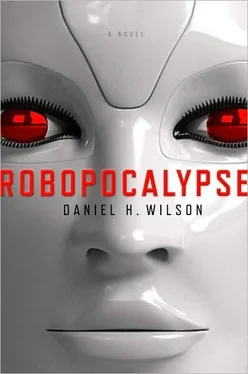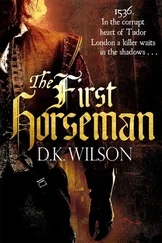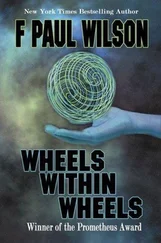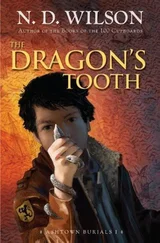Daniel Wilson - Robopocalypse
Здесь есть возможность читать онлайн «Daniel Wilson - Robopocalypse» весь текст электронной книги совершенно бесплатно (целиком полную версию без сокращений). В некоторых случаях можно слушать аудио, скачать через торрент в формате fb2 и присутствует краткое содержание. Город: New York, Год выпуска: 2011, ISBN: 2011, Издательство: Knopf Doubleday Publishing Group, Жанр: Ужасы и Мистика, на английском языке. Описание произведения, (предисловие) а так же отзывы посетителей доступны на портале библиотеки ЛибКат.
- Название:Robopocalypse
- Автор:
- Издательство:Knopf Doubleday Publishing Group
- Жанр:
- Год:2011
- Город:New York
- ISBN:978-0-385-53386-7
- Рейтинг книги:5 / 5. Голосов: 1
-
Избранное:Добавить в избранное
- Отзывы:
-
Ваша оценка:
- 100
- 1
- 2
- 3
- 4
- 5
Robopocalypse: краткое содержание, описание и аннотация
Предлагаем к чтению аннотацию, описание, краткое содержание или предисловие (зависит от того, что написал сам автор книги «Robopocalypse»). Если вы не нашли необходимую информацию о книге — напишите в комментариях, мы постараемся отыскать её.
Archos
assumes control
most are unaware
When the Robot War ignites—at a moment known…
Robopocalypse — читать онлайн бесплатно полную книгу (весь текст) целиком
Ниже представлен текст книги, разбитый по страницам. Система сохранения места последней прочитанной страницы, позволяет с удобством читать онлайн бесплатно книгу «Robopocalypse», без необходимости каждый раз заново искать на чём Вы остановились. Поставьте закладку, и сможете в любой момент перейти на страницу, на которой закончили чтение.
Интервал:
Закладка:
I am looking at a security camera image on my monitor. In the corner of the screen a label reads: Tokyo, Adachi Ward.
The image is from someplace high, looking down on a deserted street. The road below is narrow, paved, and clean. Small, neat houses line it. All the houses have fences, made of bamboo or concrete or wrought iron. There are no front yards to speak of, no curbs on the street, and most important, there is no room for cars to be parked.
A beige box trundles down the middle of this narrow corridor. It vibrates a bit on the pavement, rolling on flimsy plastic wheels that were built for indoor use only. Streaks of black soot coat the surface of the machine. Attached to the top of the box is a simple arm I built of aluminum tubing, folded down like a wing. On the front face of the robot, just below a cracked camera lens, a button of light glows a healthy green.
I call this machine Yubin-kun.
This little box is my most loyal ally. It has faithfully executed many missions for the cause. Thanks to me, Yubin-kun has a clear mind, unlike the evil machines that plague the city—the akuma .
Yubin-kun reaches an intersection painted with a faded white cross. It purposefully turns ninety degrees to the right. Then it keeps going down the block. As it is about to leave the camera frame, I push my glasses up onto my forehead and squint at the screen. Something is resting on top of this busy machine. I make out the object: a plate.
And on the plate is a can of corn soup. My soup. I sigh, happy.
Then I punch a button and the camera image switches.
Now, I see a full-color, high-resolution picture of the outside of a factory building. In Japanese, a sign across the front reads Lilliputian Industries.
This is my castle.
The squat cement walls of my fortress are peppered with pockmarks. The glass behind the barred windows has been shattered and replaced by strips of sheet metal welded onto the steel frame of the building. A rolling bay door dominates the front of the building—a modern-day portcullis.
The gate is closed tight. Though the world outside is still, I know that death lurks in the gray shadows.
Akuma —the bad machines—could be anywhere.
For now there is no movement outside, only slanting shadows cast by the evening sun. The shadows sink into the gouges torn in the walls of my castle and they pool together into the muck-filled trench that surrounds the building. The ditch is as deep as a man is tall and too wide to leap across. It is filled with acidic water and rusty scraps of metal and refuse.
This is my moat. It protects my castle from the smaller akuma who assault us daily. It is a good moat and it wants to keep us safe. But there is no moat large enough to stop the greater akuma .
Next door, part of a destroyed yellow house sags in on itself. The houses are no longer safe. There are too many akuma in this city. With poisoned minds, they chose to destroy millions. The akuma marched a docile population off in columns—never to return. The houses they left behind are made of wood and weak.
Two weeks ago, my life nearly ended in that yellow house. Chunks of yellow siding still jut out of the moat and litter the narrow walkway around the factory. It was my last scavenging trip. I am not an effective scavenger.
Yubin-kun rolls into view.
My comrade stops in front of the factory and waits. Now I stand up and stretch my back. It is cold and my old joints are creaky. A few seconds later, I turn the winch to crack open the steel rolling door. A strip of light appears near my feet, rises to maybe four feet high. I slip under the door and out into this quiet, dangerous new world.
Blinking at the sunlight, I adjust my glasses and check the street corners for movement. Then I grab the mud-covered piece of plywood that leans against the building. With a push, the slab of wood falls over the moat. Yubin-kun wheels across the slat to me and I grab the can of soup from the plate, open it, and drink it down.
The convenience store machines—the convini —still have good minds. They are not under the evil spell that haunts so much of the city. I pat Yubin-kun on its smooth back as it wheels under the rolling door and into the dark building.
Licking my fingers, I lean over and pull on the plywood slat. The other end falls into the filthy moat before I drag it out and lean it back against the wall. When I am finished, the street looks the same as before except that the plywood resting against the building is now more muddy and wet. I slip back inside and winch the rolling door down until it is closed up tight.
I return to my camera feed, which sits on my workbench in the middle of the empty factory floor. A pool of light spills onto the table from my work lamp, but otherwise the room is unlit. I must ration the electricity carefully. The akuma still use parts of the power grid. The trick is to steal the electricity quietly, in small doses, and to recharge only the local backup batteries.
On screen, nothing changes for perhaps fifteen minutes. I watch long shadows grow longer. The sun dips farther toward the horizon, turning the light a bleak yellow.
Pollution used to make the sunsets so beautiful.
I feel the empty space around me. It is very lonely. Only my work keeps me sane. I know that I will one day find the antidote. I will wake Mikiko and give her a clear mind.
In her cherry-red dress, she lies sleeping on a stack of cardboard, half-shrouded in the empty darkness of the factory floor. Her hands are clasped over her stomach. As always, her eyes seem as though they could flutter open at any second. I am glad that they do not. If her eyes were to open right now, she would murder me with single-minded purpose and without hesitation.
All things are born from the mind of god. But in the last month, the mind of god has gone insane. The akuma will not tolerate my existence for long.
I switch on the light attached to my magnifying lens. Bending its arm, I train the lens on a piece of scavenged machinery lying on my workbench. It is complicated and interesting—an alien artifact not built by human hands. I pull on my welder’s mask and twist a knob to activate my plasma torch. I make small, precise movements with the torch.
I will learn what lessons my enemy has to teach.
The attack comes suddenly. I catch something from the corner of my eye. On the camera feed, an albino two-wheeled robot with a human torso and a helmetlike head wheels down the middle of the street. It is a lightly modified prewar house nanny.
This akuma is followed by a half dozen squat, four-wheeled robots whose stiff black antennae vibrate as they speed over the swept asphalt: police-issue bomb sniffers. Then a blue two-wheeled trash can–shaped machine rolls by. It has a sturdy arm folded on top like a coiled snake. This one is a new hybrid.
A motley collection of robots floods into the street outside my factory. Most of them are rolling, but a few are walking on two or four legs. Almost all are domestic units, not designed for warfare.
But the worst is yet to come.
The camera image shivers as a shaft of dark red metal slides into view. I realize it is an arm when I see the bright yellow claw that hangs from the end. The claw snaps open and closed, trembling with the effort of moving itself. Once, this machine was a deep-forest logger, but it has been modified almost beyond recognition. Mounted on top is a sort of head, crowned with floodlights and two hornlike antennae. A stream of fire jets from the claw, licking the side of my castle.
The camera shakes violently, then cuts out.
Inside my castle all is quiet except for my plasma torch, which sounds like paper tearing. The vague shapes of the factory robots lurk in the darkness, mobile arms frozen in various poses like scrapyard sculptures. The only indication that they are alive and friendly is that the darkness is perforated by the steady greenish glow of dozens of intention lights.
Читать дальшеИнтервал:
Закладка:
Похожие книги на «Robopocalypse»
Представляем Вашему вниманию похожие книги на «Robopocalypse» списком для выбора. Мы отобрали схожую по названию и смыслу литературу в надежде предоставить читателям больше вариантов отыскать новые, интересные, ещё непрочитанные произведения.
Обсуждение, отзывы о книге «Robopocalypse» и просто собственные мнения читателей. Оставьте ваши комментарии, напишите, что Вы думаете о произведении, его смысле или главных героях. Укажите что конкретно понравилось, а что нет, и почему Вы так считаете.












